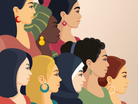WEF: Gender Health Gap 'Costs women 75mn years of Life'

The global gender health gap equates to 75 million years of life lost due to poor health or early death each year, according to insight from the World Economic Forum (WEF).
The WEF also says that closing the gap would give an estimated 3.9 billion women in the world an extra seven healthy days a year – an average of 500 days over a lifetime.
The gender health gap relates to the lack of equity concerning healthcare for women and men. This can gap can take shape in many ways, from access to care to research.
The insights follow an in-depth WEF report published in January, suggesting closing the women’s health gap could boost the global economy by $1 trillion by 2040, due to fewer early deaths and health conditions, and creating the conditions to allow women to contribute
The latest WEF report references studies conducted by a number of influential organisations, including research by the Bill & Melinda Gates Foundation that was published in The Lancet, showing that although women live longer than men, they spend more of their lives in poor health.
"It is also important to continue promoting gender-sensitive research, The WEF focuses on six “underdiagnosed” conditions it says highlight the gender health gap.
The gender health gap: Heart disease
The WEF says women in the UK are around a third less likely to receive a coronary angiogram after a heart attack, and that women are not only more likely to die after being admitted to hospital with a severe heart attack, but also less likely to be prescribed medication to prevent future heart attacks, such as statins.
This chimes with the global picture, where women are seven times more likely to die from a heart attack after they seek medical help, according to a leading McKinsey health expert, who says
The gender health gap: Endometriosis
Endometriosis is referred to as “the missed disease” because so much remains unknown about it, and also because it’s underdiagnosed.
Globally, it affects 10% of women and girls of reproductive age, but in the US, says WEF, only two out 10 cases are diagnosed, with diagnosis taking more than seven years – and even longer for black women.
The gender health gap: Autism
Around three times as many boys are diagnosed with autism as girls, but the WRF says girls are often diagnosed later than boys, or not diagnosed at all, which can lead to mental health problems in adulthood, according to research.
It adds that medical gender bias contributes to this underdiagnosis in women, it points out, because girls often don’t present with the same behaviours and symptoms as boys – and they learn to “mask” those that don’t fit with social norms.
The gender health gap: ADHD
Another neurological condition that frequently co-occurs with autism, and is similarly mis- or under-diagnosed in females, is attention deficit hyperactivity disorder (ADHD). In the US, fewer than 1% of women have a ADHD diagnosis, but the number is growing rapidly, says the WEF.
It adds that research undertaken in 2023 found the rate of diagnosis among women aged 23 to 49 almost doubled between 2020 and 2022, and that women tend to be diagnosed later in life than men.
It points out that, as with autism, ADHD symptoms present differently in women, while historically, research focused on boys with the condition.
The gender health gap: Autoimmune conditions
Autoimmune diseases are those that stimulate the body's immune defences to attack itself and include lupus, psoriasis, multiple sclerosis, rheumatoid arthritis and thyroid diseases.
After cancer and heart disease, they are the third most prevalent disease category.
The WEF says women account for the majority (80%) of people with autoimmune diseases, but that American Autoimmune Association studies show it takes an average of five years for them to get a diagnosis).
The gender health gap: Antimicrobial resistance
It's estimated that antimicrobial resistance (AMR) – when parasites, bacteria and viruses evolve to be drug-resistant – could be responsible for around 10 million deaths a year by 2050. The WEF quotes World Bank estimates that put the increased cost of healthcare at $1 trillion.
It adds that new research from the World Health Organization also suggests women are more exposed to these so-called superbugs than men, through childbirth, for example.
Amira Ghouaibi, WEF Project Lead of the Women’s Health Initiative says of the gender health gap: “Every woman should be able to receive quality care when and where she needs it. We will only be able to achieve this once we examine the state of the women’s health gap, and then identify the biggest disparities to inform strategies and policies towards better women’s health outcomes.”




